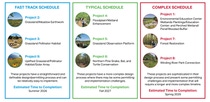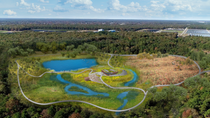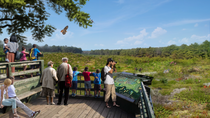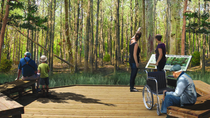New Jersey
BASF to move forward with restoration projects at the Toms River, NJ site
Community engagement opportunities
Project timeline
Since the execution of the Settlement Agreement, BASF has conducted preliminary design studies, solicited input from the public, and collected feedback from the NJDEP on the nine ecological restoration projects. As presented in the Scope of Work found as Appendix B of the Settlement Agreement, some of the projects are more complex than others. Therefore, the nine projects were broken up and placed into three categories based on their level of effort (Fast Track, Typical, and Complex). Based on the feedback, select projects were redefined and re-categorized into the three categories. The revised schedule is shown below.

Read BASF response to NJDEP public comment period
In August 2023, the New Jersey Department of Environmental Protection (NJDEP) and BASF reached a final settlement agreement that resolves natural resource damage claims at the Ciba Geigy Superfund Site in Toms River, NJ.
BASF has agreed to preserve 1,000 acres of the Site and implement nine ecological restoration projects.
Following a three-year engagement with the NJDEP, BASF is pleased that the Natural Resource Damages (NRD) Settlement Agreement for the Ciba Geigy Superfund site in Toms River, NJ, has now been finalized. This agreement allows us to move forward with the restoration and conservation projects that will benefit the Toms River site and community.
BASF is fully committed to the terms of the NRD Settlement and appreciates the diligence and professionalism demonstrated by NJDEP throughout this process. We look forward to preserving the land, implementing the planned environmental projects and opening new possibilities to encourage recreation, learning and community engagement at the site for decades to come.
By way of background, BASF did not conduct any activities that resulted in, or contributed to, contamination at the Toms River Site. All necessary measures have been and continue to be taken under an Environmental Protection Agency-led remediation process to ensure the Site is protective of human health and the environment. To date, BASF and its predecessors have spent over $300 million to remediate the Site. That remediation effort is ongoing and is not impacted by the NRD Settlement.
The purpose of this NRD settlement is to compensate the public for damages to natural resources, in particular, impact to groundwater. BASF continues to extract and remediate groundwater beneath the Site and the surrounding area. This groundwater is, on average, 25 feet below the ground surface; its presence creates no safety issues for the visiting public.
To ensure that hiking, walking, birdwatching, and other passive recreational activities envisioned for the Site would be safe, BASF extensively studied the Site and performed a risk evaluation under the guidance of the New Jersey Department of Environmental Protection and Environmental Protection Agency.
There are two major components of the NRD settlement: (1) BASF will preserve 1,000 acres of land; and (2) BASF will construct ecological restoration projects on about 375 of the 1,000 acres. The 1,000 acres would be permanently preserved for the benefit of the public, providing for groundwater recharge and preserving the ecological value of the land by protecting it from future development. The restoration projects will be designed to enhance natural resources and support future public access and educational uses of the Site. We expect the following elements to be included:
- Development of a freshwater wetlands complex, restoration of riparian areas, flood plain and wetland enhancements
- Creation of upland grasslands, pollinator habitat and protection of many threatened and endangered species
- Trails and boardwalks for wildlife viewing and passive recreation, such as walking, running, hiking, birdwatching, etc.
- An environmental education center that expands on the educational work we already do with Toms River High School and Manchester High School. BASF is open to including the Site’s environmental history as part of the educational facility, which is already a part of the BASF outdoor educational activities.
BASF expects to spend tens of millions of dollars on their construction. BASF will also pay the State $500,000 for its cost in overseeing BASF’s construction of the projects and will ensure that projects are maintained for a period of 20 years. BASF will always own and maintain an environmental management area at the Site that includes the groundwater treatment operation, solar array, landfill and capped areas. In addition, the company will retain ownership of the entire 1,000 acres subject to the conservation easement until such time as both BASF and the State of NJ identify an appropriate third-party (land trust or the like) that would maintain the property per the terms in the conservation easement. In the unlikely event that the third-party fails to comply with the conservation easement, ownership of that parcel would transfer to the State of New Jersey.
As to the property tax appeal, the value of the property was determined by the NJ Supreme Court during a specific time period (2004-2018), based upon the existing restrictions and conditions at the site at that time. With the ongoing measures we are taking, the property is expected to gain significant future value, and in particular, ecological value that will be protected by the restrictions on development required by the NRD Settlement.
There is general agreement and recognition by state leaders, environmental groups and other non-governmental organizations that, where possible, focused restoration is preferable to litigation as it saves time, saves public resources, and achieves the goal of returning value to the area of injury. This is precisely the approach taken in the NRD Settlement. It should also be noted that the 2017 amendment to Paragraph 9 of Section II of Article VIII of the New Jersey Constitution provides direction to the NJDEP regarding how to spend natural resource damage funding that is collected. The public should understand that, even if money had been collected, it does not have to be spent on restoration in Toms River, if no appropriate projects are available. The money could be spent in the same water region or even elsewhere in the State. The current approach is the only option that guarantees a direct benefit to the Toms River community.
Starting in 2021, BASF has engaged in conversations with the Township regarding the NRD Settlement and the Township’s reuse preferences for the property outside the NRD Settlement. Any such development of the remaining acreage would not include residential and would be consistent with the Township’s industrial zoning designation and all local, state and federal regulations.
Watch here: BASF Restoration Projects in Toms River, New Jersey - Restoring Nature, Connecting Community

Freshwater wetland complex & groundwater recharge with perched wetland, bird houses and boardwalk

New environmental education center & pollinator habitat

Upland meadow & bird watch platform for wildlife viewing

Enhanced grassland & Atlantic White Cedar restoration habitats with viewing platform and signage
Protection of many threatened and endangered species including the grasshopper sparrow
